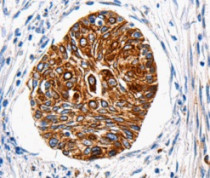ARG42976
anti-HTR1A / 5HT1A Receptor antibody
anti-HTR1A / 5HT1A Receptor antibody for IHC-Formalin-fixed paraffin-embedded sections,Western blot and Human,Mouse
Overview
| Product Description | Rabbit Polyclonal antibody recognizes HTR1A / 5HT1A Receptor |
|---|---|
| Tested Reactivity | Hu, Ms |
| Tested Application | IHC-P, WB |
| Host | Rabbit |
| Clonality | Polyclonal |
| Isotype | IgG |
| Target Name | HTR1A / 5HT1A Receptor |
| Antigen Species | Human |
| Immunogen | Synthetic peptide of Human HTR1A / 5HT1A Receptor. |
| Conjugation | Un-conjugated |
| Alternate Names | 5-hydroxytryptamine receptor 1A; 5HT1a; ADRB2RL1; 5-HT-1A; PFMCD; ADRBRL1; Serotonin receptor 1A; 5-HT1A; G-21 |
Application Instructions
| Application Suggestion |
|
||||||
|---|---|---|---|---|---|---|---|
| Application Note | * The dilutions indicate recommended starting dilutions and the optimal dilutions or concentrations should be determined by the scientist. | ||||||
| Positive Control | WB: HT-29 and Mouse brain IHC-P: Human cervical cancer |
||||||
| Observed Size | ~ 45 kDa |
Properties
| Form | Liquid |
|---|---|
| Purification | Affinity purification with immunogen. |
| Buffer | PBS (pH 7.4), 0.05% Sodium azide and 40% Glycerol. |
| Preservative | 0.05% Sodium azide |
| Stabilizer | 40% Glycerol |
| Concentration | 0.8 mg/ml |
| Storage Instruction | For continuous use, store undiluted antibody at 2-8°C for up to a week. For long-term storage, aliquot and store at -20°C. Storage in frost free freezers is not recommended. Avoid repeated freeze/thaw cycles. Suggest spin the vial prior to opening. The antibody solution should be gently mixed before use. |
| Note | For laboratory research only, not for drug, diagnostic or other use. |
Bioinformation
| Database Links | |
|---|---|
| Gene Symbol | HTR1A |
| Gene Full Name | 5-hydroxytryptamine (serotonin) receptor 1A, G protein-coupled |
| Background | This gene encodes a G protein-coupled receptor for 5-hydroxytryptamine (serotonin), and belongs to the 5-hydroxytryptamine receptor subfamily. Serotonin has been implicated in a number of physiologic processes and pathologic conditions. Inactivation of this gene in mice results in behavior consistent with an increased anxiety and stress response. Mutation in the promoter of this gene has been associated with menstrual cycle-dependent periodic fevers. [provided by RefSeq, Jun 2012] |
| Function | G-protein coupled receptor for 5-hydroxytryptamine (serotonin). Also functions as a receptor for various drugs and psychoactive substances. Ligand binding causes a conformation change that triggers signaling via guanine nucleotide-binding proteins (G proteins) and modulates the activity of down-stream effectors, such as adenylate cyclase. Beta-arrestin family members inhibit signaling via G proteins and mediate activation of alternative signaling pathways. Signaling inhibits adenylate cyclase activity and activates a phosphatidylinositol-calcium second messenger system that regulates the release of Ca(2+) ions from intracellular stores. Plays a role in the regulation of 5-hydroxytryptamine release and in the regulation of dopamine and 5-hydroxytryptamine metabolism. Plays a role in the regulation of dopamine and 5-hydroxytryptamine levels in the brain, and thereby affects neural activity, mood and behavior. Plays a role in the response to anxiogenic stimuli. [UniProt] |
| Cellular Localization | Cell membrane; Multi-pass membrane protein. [UniProt] |
| Calculated MW | 46 kDa |
Images (2) Click the Picture to Zoom In
-
ARG42976 anti-HTR1A / 5HT1A Receptor antibody IHC-P image
Immunohistochemistry: Paraffin-embedded Human cervical cancer tissue stained with ARG42976 anti-HTR1A / 5HT1A Receptor antibody at 1:100 dilution.
-
ARG42976 anti-HTR1A / 5HT1A Receptor antibody WB image
Western blot: 30 µg of HT-29 and Mouse brain lysates stained with ARG42976 anti-HTR1A / 5HT1A Receptor antibody at 1:1500 dilution.







